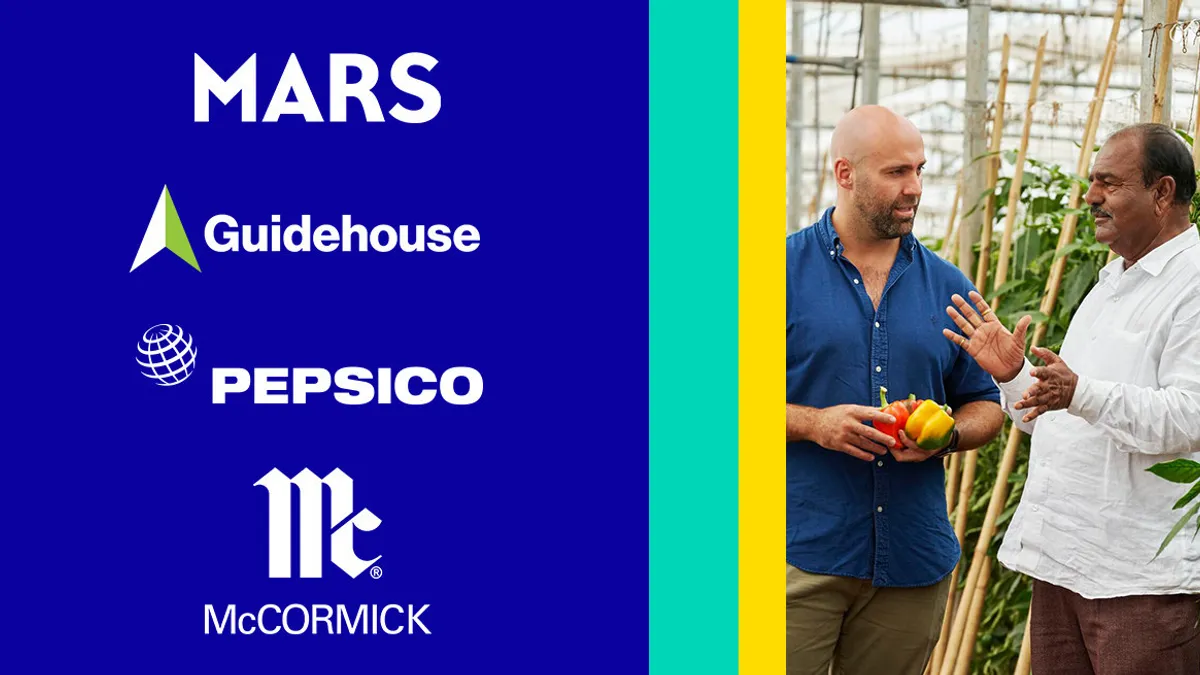Dive Brief:
- Mars, PepsiCo and McCormick have partnered with sustainability consultancy Guidehouse to create a new Supplier Leadership on Climate Transition coalition that aims to drive emissions cuts in global supply chains, according to a press release.
- The coalition will provide suppliers with resources and tools to create their own emissions-reduction plans. The first year of the program will focus on educating companies about greenhouse gas emissions, and how to calculate their GHG footprints and create science-based targets.
- As the leading partner, Mars' effort is part of its 2019 #PledgeforPlanet initiative, in which it aims to engage its 200 largest suppliers to push broader sustainability-focused improvements throughout its supply chain.
Dive Insight:
Manufacturers can make in-house changes around sustainability, such as switching to renewable energy sources, curbing water use and finding opportunities to upcycle ingredients, but they can have a broader impact by honing in on emissions in their supply chains.
Mars has already been active in pursuing this strategy. In 2019, it launched its #PledgeforPlanet initiative, which challenges its suppliers to set climate targets that meet the Science Based Targets Initiative, where companies adopt science-based targets for emissions reductions, and to join the The Climate Group's RE100 renewable energy initiative. Thus far, 23 of Mars' major suppliers have set their own science-based targets or joined the RE100, and another 30 are in talks to do so.
By pushing its suppliers to take action, Mars aims to shorten the timeline for its own GHG emission cuts across its extended value chain. This includes a 27% cut in direct (scope 1) and indirect (scopes 2 and 3) GHG emissions by 2025 and a 67% reduction by 2050 from a 2015 baseline.
Mars has shown an appetite for tackling complex sustainability goals. The company has transitioned 54% of its global power usage to renewable sources and is on track to reach its 2025 target ahead of schedule. It also estimates that by 2024 it will have cut over 42% of emissions from direct operations with the goal of being net-zero by 2040.
McCormick has also shown interest in tackling its carbon footprint. Last year, it announced plans to reduce its emissions while also adopting sustainable sourcing practices for its top five ingredients. And PepsiCo recently committed to sourcing all of its U.S. electricity needs from renewable sources.
While tackling emissions from the supply chain can have massive implications, it's also a challenge, especially for large companies with global supply chains and countless moving parts. Walmart encountered this challenge when designing its scope 3 goals, ultimately committing to reduce its emissions by 1 billion metric tons by 2030 compared to its 2015 baseline.
Other industry players have made commitments to tackle emissions from their supply chains. Diageo beat its target of a 30% reduction in absolute greenhouse gas emissions along its total supply chain and a 50% reduction in direct emissions by 2020. Hershey announced it would reduce its direct and indirect emissions by more than 50% by 2030 compared to 2018. And Nestlé is investing $3.6 billion towards cutting its emissions in half by 2030, focusing its efforts across its entire supply chain.













